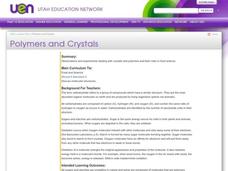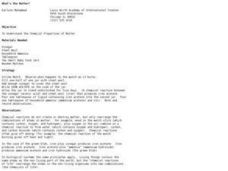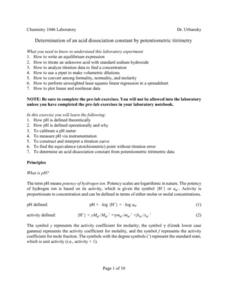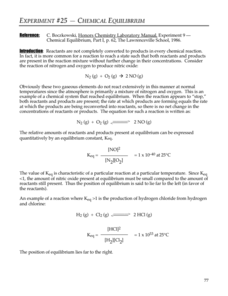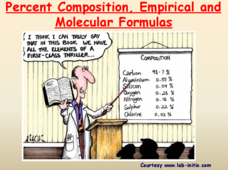Curated OER
WS 7.1 Kinetic-Molecular Theory of Gases/Pressure
In this kinetic molecular theory worksheet, students summarize the points of the kinetic molecular theory, they answer questions about pressure, and draw diagrams to show how suction cups, drinking straws and barometers work.
Curated OER
Covalent and Ionic Bonding:Electron Dot Structures with Ionic Notation
After drawing the valence electron distribution of 13 basic elements, there are spaces to draw 18 more complicated molecules. For each molecule, there is space for a Dot structure and Lewis structure that best describes the...
Curated OER
Review Set
The topics covered in these multiple choice questions are about atomic structure and bonding, state configurations, pressure and solution concentration, and energy graphs. This is a midterm review which could be used with the whole...
Curated OER
Spectral Lines
Slides and slides of emission spectra bring this topic to light for your physics class! Exited electrons returning to lower energy levels is offered as the cause of emission spectra. In summary, viewers learn that we can determine the...
Curated OER
Relative Mass Formula, Atomic Formula, and Empirical Formula
After giving the definitions of the different compound terms and formulas, equations are provided to teach your chemists to calculate different values. Relative formula mass, atomic mass, and empirical mass are shown and explained with...
Curated OER
Typical Numeric Questions for Physics I - Atomic Spectra
Seven practice problems are presented to physics pros in this assignment. Given the wavelengths, they perform computations for emission spectra. This brief worksheet makes an appropriate pop quiz.
TLS Books
Neptune
Did you know that Neptune is named after the Roman god of the sea? Young astronomers read about this and other facts about the eighth planet from the sun in a short informational text passage.
Chymist
Visualizing pH
Why are acids and bases important in our daily lives? Lead the class in answering this question, among others, as they experiment with pH paper and classify where various substances belong on the pH scale. They also taste common acids...
Curated OER
Polymers and Crystals: Their Role in Food Science
Blend chemistry with cooking in this exploration of polymers, carbohydrates, and food science. Experimenting with gelatin produces concrete examples of the bonding and ploymerization discussed in the lesson. Copious, comprehensive...
Curated OER
What is Water?
Students examine water's properties. They participate in hands-on activities to show the properties of water.
Curated OER
What's the Matter? (Living and Non-Living Things)
Understand how chemical reactions recombine atoms to create the "chemicals of life". An experiment, showing the basic chemical reactions of an iron nail or a match, helps young children start their understanding of permanent changes.
Curated OER
Determination of An Acid Dissociation
In this chemistry worksheet, students examine the given concept in order to apply in the laboratory setting. The sheet includes in depth background information.
Curated OER
Oxidation Reduction Reactions
In this chemistry worksheet, students find the outcomes necessary for the oxidation reduction reactions. The sheet includes background information.
Pingry School
Chemical Equilibrium
We know about the light spectrum, the age spectrum, and sound spectrum, but do chemical reactions also occur on a spectrum? Young scientists experiment with partial reactions on a spectrum and observe the color changes. Then, they...
Curated OER
WS 1.7 Density /Archimedes Principle
Archimedes' principle is practiced as chemistry learners practice computing the density of different gases, liquids, and solids. Using a chart of standard densities, they also identify unknown materials by similar calculations. Fifteen...
Curated OER
WS 1.7 Density
In this density activity, students calculate the density of objects given their mass and volume. They are given a table with the density of a variety of substances and given the mass or volume and must find the unknown.
Curated OER
Why and How Atoms Combine
Here is a top-notch handout to supply your chemistry class with. It covers valence electrons, Lewis diagrams, the octet rule, and more! Technically it is less of a worksheet than a detailed explanation of these chemical bonding concepts....
Curated OER
Scientific Notation
Review conversion of decimal numbers into SN form with these examples of common astronomical applications and quantities. Young learners rewrite those numbers with scientific notation and with the correct units. The answers are available...
Curated OER
Fossil Fuels Summary
As the title suggests, this is a simply summary of fossil fuels. There are no questions to answer or problems to solve, just notes about fossil fuels. The notes cover how fossil fuels are formed, how we extract it, what humans use it...
Curated OER
Chapter 14 Review, Section 1: Acids and Bases
An overview of acid and base compounds and their reactions is presented with this handout. Pupils name compounds and write chemical formulas. They write net ionic equations and explain how acidic solutions might conduct electricity. This...
Curated OER
Chapter 14 Review, Section 2: Acids and Bases
Lewis acids and bases, Brønsted-Lowry acids and bases, ionization, and more are covered by this chemistry handout. It serves as a review of a specific textbook section, but will also serve as a nice review for any general chemistry...
Curated OER
Empirical Formula
Plenty of time was invested in creating this detailed presentation. The first slide alone includes several steps that support your explanation of percent composition, a precursor to understanding how to write empirical and molecular...
Science Geek
The Mole
What can you call a tooth in a glass of water? A one-molar solution! Presentation covers moles, Avogadro's Number, calculating formula mass, converting moles to grams, converting grams to moles, and calculations with moles. It is...
Science Geek
Percent Composition, Empirical and Molecular Formulas
Help your pupils understand when empirical becomes molecular. The lesson presentation demonstrates the connection between empirical formulas and molecular formulas. Then, given percent composition, the lesson demonstrates the steps to...
Other popular searches
- Hydrogen Peroxide Liver Lab
- Hydrogen Atom
- Hydrogen Bonding
- Hydrogen Bonds
- Hydrogen Peroxide
- Hydrogen Ions
- Hydrogen Fuel Cell
- Hydrogen Cycle
- Hydrogen Fuel
- Hydrogen Bonding in Water
- Hydrogen Bonding Lab
- Hydrogen Driven Automobiles










